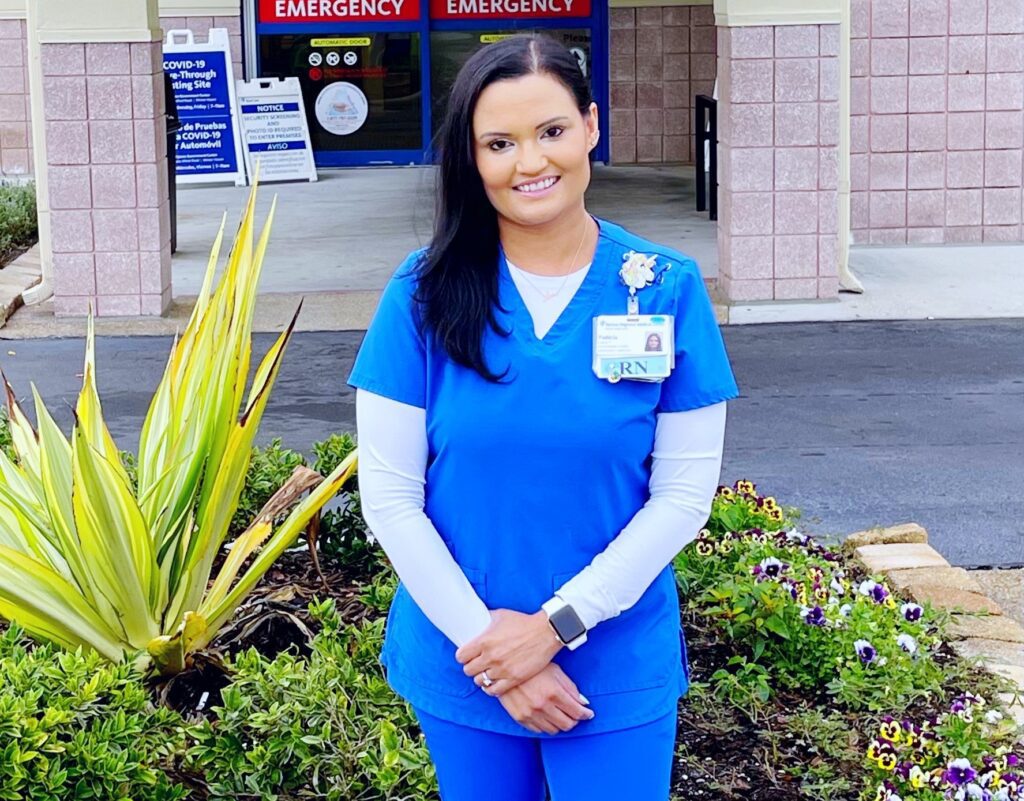Bartow Regional Nurse Talks About a Familiar Profession in an Unfamiliar Time
by TERESA SCHIFFER
For over a year now, our medical personnel have been on the front lines of an unprecedented battle, fighting a new type of enemy in the form of the novel coronavirus that we now call COVID-19. While researchers having been racing to find solutions to problems as quickly as they occur, we have relied on doctors and nurses to treat us and our loved ones with care, competence and compassion. These dedicated professionals have risked their health and lives while distancing themselves from their own families in order to take care of ours. Truly, they deserve every honor and recognition that we as a society can give them right now.
If you have never worked in the healthcare industry, you may not be aware of the huge toll an overwhelming crisis such as the COVID-19 pandemic can take on those who care for the patients impacted. Felicia Braddy is an RN who works in the emergency room at Bartow Regional Medical Center, and she’s shedding some light on what it’s like to be a nurse in this strange, new era.
Braddy attended Galen College of Nursing in St. Petersburg and now, in addition to her emergency room duties, she also works closely with the nursing students of Polk State College and other nursing students in this area. She loves nursing and knowing that she is making a substantial, positive impact on the lives of real people in need of care. She admits that the COVID-19 crisis has presented a number of challenges for medical care providers worldwide.
“Personally, the most challenging aspect has been the length of time it has taken us as healthcare workers to learn how to treat COVID-19 patients from a medical and an emotional perspective,” Braddy says. “Early on, there was a lot that the medical community did not know about COVID-19 and how it affected the body. We also had a hard time adjusting to being the only emotional support for patients at their bedside, while also making multiple phone calls trying to keep their family members in the loop, all while wearing PPE (personal protection equipment) that was unfamiliar to us. It was a brief period of adjustment, but we all pulled together to help our patients.”
Therein is the crux of the successes generated by the medical community in the ongoing fight against this evolving disease — teamwork. Throughout the nation and world, healthcare workers have pulled together to combat the insidious virus that has presented so many obstacles when it comes to effective treatment. Doctors, nurses, and support staff have had to wear many hats over the course of the pandemic, moving deftly through whatever health roles were necessary as well as serving as the critical link to patients’ families.
“The most rewarding part of being an emergency nurse during the pandemic has been the opportunity to see my fellow co-workers, nurses, doctors, techs, paramedics, respiratory therapists – the entire care team – come together and work so hard for each and every patient, day after day,” Braddy explains.
“This is true especially for those critically ill patients, and when that patient turns the corner and has a favorable outcome, to see the pride in everyone’s eyes, we know what we are doing every day is completely worth it.”
As with any other career, nursing has its high points and its low moments. Feeling like a superhero on Monday can be quickly followed on Tuesday by the sinking sensation of having to deliver bad news to someone.
“Some days, it’s hard having to tell a wife that she can’t be next to her critically ill husband because they are both COVID positive. Some days are harder than others, but I will always love being a nurse,” confides Braddy.
Nursing can be an excruciating ordeal for the emotionally sensitive, but fortunately there are plenty of stories that have happy endings. Braddy reminisces about a COVID patient she treated who was in serious condition and spent multiple weeks in the ICU.
“She was never allowed to have her family with her the entire time because of COVID, but about a month later, she walked back into the ER as a patient for something minor. She had made a full recovery,” Braddy remembers.
“She didn’t remember me or the majority of what she had gone through, but we started talking, and she was extremely grateful. She reminded me why I became a nurse, why we keep going, even when we are tired, and why we don’t just give up on our patients.”
As a society, we are so very fortunate to have individuals like Braddy working for our well-being. “The single most important quality a nurse can have is the desire to do the right thing for your patient. That desire should be a nurse’s top priority,” she says.
However, nursing also bestows a unique wisdom upon those who choose to follow this calling, as the peaks and valleys of life are revealed on a daily basis to these heroes.
“Being a nurse,” Braddy says, “gives you a unique perspective on life in general. Along the way, you realize how short life can be. You learn to maybe let that argument with your spouse slide, not to sweat the small stuff … because tomorrow is not promised.”
